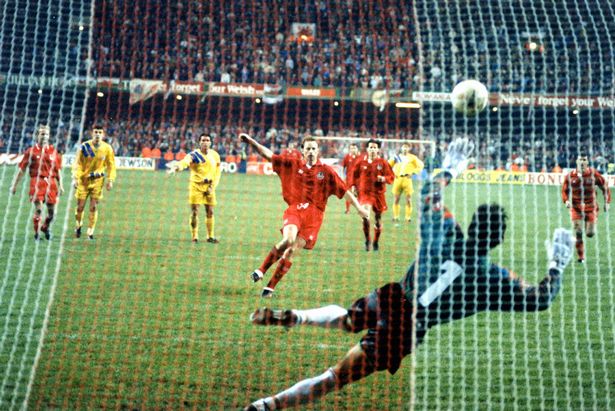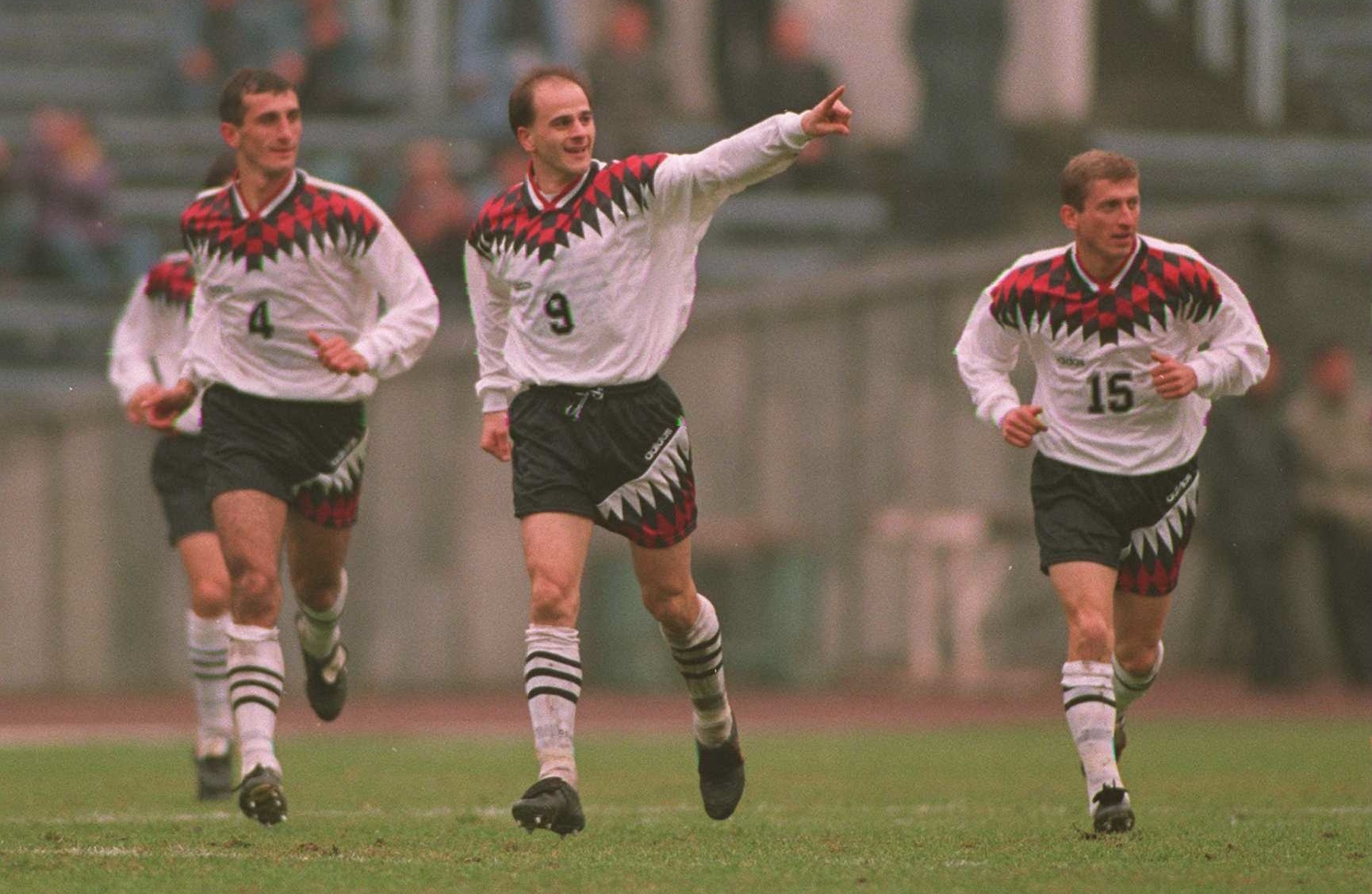Wales’ narrow victory in Tbilisi on Friday night kept alive their World Cup hopes and, coupled with Serbia’s defeat in Austria, gave them an outside chance of automatic qualification for Russia. The gritty performance exemplified the great strides the Welsh side have taken in the past few years, and while they look to qualify for their first World Cup in sixty years and erase the memories of campaigns that have taken them so close, Tom Lawrence’s second-half winner also laid to rest the darkest moment in modern Welsh football history - the last time Wales travelled to Georgia, in 1994.
“Wales with the chance to lead 2-1. Paul Bodin to take it…OOOOH AND HE’S HIT THE CROSSBAR”. The thud of the ball bouncing off the woodwork reverberated around Cardiff Arms Park on that bitter November evening, and has ingrained itself into the consciousness of every heartbroken Wales fan that witnessed it. Their best chance to qualify for a World Cup since 1958 disintegrating before their eyes and, when Florin Raducioiu went up the other end to seal a 2-1 win, it was Romania that took their place at USA ’94. A qualifying campaign full of ups and downs had seen an impressive win at home against Belgium and two hard-fought points against Czechoslovakia tempered by a hammering away at Romania. But still they went into the last game of the group with an excellent chance to progress. Alas, it was not to be.

The defeat led to popular manager Terry Yorath being dispensed with by the FAW following the expiry of his contract, and after a single game spell for John Toshack, former national manager Mike Smith was brought in for his second spell in the Wales dugout. Hopes were high that Smith could carry on Yorath’s good work, but if the 17th November 1993 was the most disappointing night in Wales’ modern history, a trip to Tbilisi almost exactly a year later would see The Dragons hit their international nadir.
Smith’s first two games in charge saw Wales take on Sweden and Estonia in friendlies. The Swedes warmed up for their eventual third place finish at the World Cup with a 2-0 victory at Ninian Park, while a tight encounter in Tallinn saw the Welsh escape with a 2-1 victory. Qualifying Group 7 for Euro ’96 had given Wales a tough, but not impossible, task. Euro ’92 finalists Germany were expected to top the group, though stiff competition would come from a Bulgaria side that had knocked them out of USA ’94 and boasted the mercurial talent of Hristo Stoichkov. Albania were expected to be the patsies of the group, having finished bottom in the World Cup Qualifiers. The rest of the draw was made up of two relative unknowns in Moldova and Georgia. Independence from the Soviet Union had only been achieved by the two nations in the early 1990s, and Euro ’96 was the first qualifying campaign either had entered. Of the two, Georgia were considered to have the most talent at their disposal, and members of their squad in 1994 would go on to find success in Europe’s major leagues, but the sense was that the second qualifying place in the group would be a straight shootout between Wales and Bulgaria.
A 2-0 victory at home to Albania in their opening fixture gave Wales the perfect start, goals from Chris Coleman and Ryan Giggs, the jewel in the Welsh crown, capping a comfortable evening in Cardiff for the hosts. A defeat in their next qualifier, at the Republic Stadium in Moldova, was seen as a slight hiccup. It had looked plain sailing when Gary Speed had given Smith’s side a fifth minute lead, but they were quickly pegged back with Tiligul Tirasol’s midfielder Serghei Belous scoring his first and only international goal for Moldova. The hosts eventually ran out 3-2 winners, and overriding opinion was that Wales had underestimated their mysterious opponents. Surely this lack of preparation would be addressed ahead of their trip to Georgia next time out.
A major blow was dealt to Smith’s plans ahead of the tie, with the news that Giggs had pulled out of the squad with an injury. It was to become regular fixture of the winger’s career and, despite his obvious natural talent, his lack of commitment to the national team became a major gripe with Welsh supporters. Giggs’ absence still left the manager with a squad full of seasoned top-level players, as well as a selection of exciting prospects breaking into the Wales first team. The line-up against Georgia included household names in goalkeeper Neville Southall, the ever-dependable Gary Speed in midfield, and a front three of Mark Hughes, Ian Rush and Dean Saunders – all of whom were first choice strikers at clubs vying for the Premier League title. The likes of Sunderland’s Andy Melville, Nottingham Forest’s David Phillips, and Newcastle’s Alan Neilson may sound unfamiliar to readers born after the mid-90s, but all three had solid careers in the upper echelons of the football league, and were certainly no mugs.

Among the hosts’ lineup were captain Kakhaber Tskhadadze, who at the time played in defence for Eintracht Frankfurt; Temur Ketsbaia, a forward who looked a decade older than his 26 years, and played his club football in Cyprus; Shota Arveladze, coming off the back of another successful season leading the line for Dinamo Tbilisi, and his clubmate Giorgi Kinkladze, a 21 year-old midfielder earning admiring glances from clubs across Europe for his skillful dribbling ability. Georgia would offer Wales a strong test, but surely Premier League experience would win out.
A tentative start saw Wales fall behind just before the half-hour, Ketsbaia curling past Southall from the edge of the area and sparking wild celebrations from his teammates. A desperation from the Welsh to get themselves back on level terms before half-time, and with their back four creeping higher up the pitch, saw a through ball to Kinkladze leaving the winger one-on-one with Southall, and he duly slid the ball under the big ‘keeper to double Georgia’s lead. Thankfully, half-time was round the corner and gave Smith a chance to regroup his players and try to rescue something from a grim and grey evening in Eastern Europe. The more experienced Kit Symons was introduced for Neilson, and Wales headed out for the second half looking for an early goal to get back into the tie.
And there was an early goal. Three minutes after half-time, Georgia surged forward again and, with Wales’ midfield seemingly wading through treacle, Ketsbaia picked up the ball on the left wing and floated a glorious shot into Southall’s top corner. It was hard to see Smith’s men coming back from three down, and quickly the game had turned from consolidation to damage limitation. Ten minutes later it looked for all the world that Kinkladze’s toe-poke had found the bottom corner, only for it to bounce off the far post and into the relative safety of Ketsbaia in the corner. The balding maniac then jinked his way into the Wales area and laid the ball off for Gocha Gogrichiani to delicately lob over Southall from six yards out. The defending from the Welsh was sub-Sunday league, allowing their opponents space and time on the ball, seemingly disinterested in winning back possession. With half an hour to go and the game well gone, a national sporting embarrassment was in danger of becoming seismic. With the likes of Jeremy Goss and Paul Bodin to call on from the bench, Smith opted against making changes – perhaps sadistically forcing his first eleven to endure the remainder of the game. The Georgians could barely believe the score themselves, huddling together in pockets across the pitch as the ball bounced over the goal-line to give them a four goal lead. Their previous largest margin of victory had been three goals, in a 6-3 friendly victory over Azerbaijan, but to take such a substantial lead against a side that were a crossbar’s height away from World Cup qualification a year earlier was way beyond pre-match expectations. Seven minutes later, it was five. Arveladze latched onto a deflected through ball, and cooly slotted past Southall to confirm Wales’ biggest defeat since a 6-1 reverse against France nearly forty years earlier. It was also the biggest competitive defeat in Wales’ footballing history, and gave Georgia their first ever competitive victory.
Any momentum gathered in the previous qualifying campaign had been sucked out of the national team set-up, and the loss in Georgia was followed up by two comprehensive defeats against Bulgaria, ending Wales’ chances of qualifying for Euro ’96. Mike Smith vacated the manager’s office, with former Coventry City boss Bobby Gould appointed in his stead but, despite a creditable 1-1 draw in Dusseldorf against eventual tournament winners Germany, Wales finished bottom of the group on eight points, their goal difference of minus ten too inferior to topple minnows Albania.
Georgia’s first qualifying campaign had, overall, been a success. A third placed finish behind Bulgaria and Germany far exceeded pre-campaign predictions, and by the time the tournament rolled around their star player Giorgi Kinkladze had wowed the Premier League after a move to Manchester City. Arveladze enjoyed four prolific seasons with Trabzonspor in Turkey before becoming a cult hero at Ajax and Rangers, and Temur Ketsbaia swapped terrorising Welsh defences for terrorising the St James’ Park advertising hoardings in a madcap three year spell with Newcastle. Their Euro ’96 campaign remains the country’s best performance in qualification.
Wales’ last-gasp despair against Romania quickly became a distant memory, and in the qualifying campaign for France ’98 they suffered another humbling defeat, though the 7-1 loss in the Netherlands was less surprising than their hiding in Tbilisi. Mark Hughes replaced Bobby Gould as national team manager after another dismal qualification campaign, this time for Euro 2000, and within four years he had turned the team’s fortunes around. 2002 saw Wales undefeated in a calendar year for the first time in living memory, and memorable victories over Germany and Italy were recorded – the latter as part of the Euro 2004 qualifying campaign that would again end in heartbreak. A 1-0 aggregate defeat to Russia in the playoffs denying Hughes hero status. A tumultuous five year reign under Toshack brought them no closer to tournament qualification, but the progress made under Gary Speed suggested that the future was bright for the Welsh national side, only to be halted in tragic circumstances. Finally, in September 2015, on a balmy night in Nicosia, Wales confirmed their qualification for the European Championships with a 1-0 victory over Cyprus.
Their stunning performance in France last summer has only given their long-suffering fans a thirst for more, and a campaign that has looked steady if not spectacular sees them heading into a shoot-out with Ireland on Monday knowing victory all but guarantees them a play-off place. If they win and Serbia slip up at home to Georgia, the Welsh supporters can begin booking their hotels for Russia next summer, and the nightmare of Romania ’93 can join Georgia ’94 in the history books.